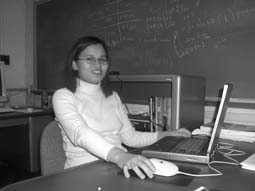Personal tools
News from ICTP 100 - Profile

ICTP Diploma Course graduate Cristine Villagonzalo has pursued a lifetime of learning with one major goal in mind: to become the best teacher that she can.
Learning to Share

"As long as I can remember,"
says Cristine Villagonzalo who graduated from the ICTP
Diploma Course in 1997, "I've wanted to be a teacher. When
I was a child in the Philippines, just before going to sleep,
I would often take a few moments to puff up my pillows at the
head of my bed for the lesson of the day. The pillows were my
students--not too bright but never disrespectful."
A life-long quest for learning has turned Villagonzalo's childhood
games into a postdoctorate position in the department of physics
at West Virginia University (USA), where she pursues theoretical
studies on the interface of cobalt/copper multilayers--materials
whose resistance to electrical currents changes dramatically in
the presence of a magnetic field. According to condensed matter
physicists, such giant magnetic-resistance (GMR) behaviour could
serve as the basis of important improvements in information storage
technologies.
Because Villagonzalo has always pursued education with teaching
in mind--in her own words, she has always wanted to "learn
in order to share"--she has pursued a variety of subjects
related to condensed matter physics and material science throughout
her university training.
As an undergraduate at the University of the Philippines, she
concentrated on the characterisation and production of polycrystalline
films in plasma; as a master's degree student at the university,
she studied anisotropic potential scattering; as an ICTP Diploma
Course student, she explored neutron scattering of helium; and
as a doctoral student at Chemnitz University of Technology in
Germany, she focussed on issues related to thermoelectric transport
at the metal-insulator transition in disordered systems, which
laid the groundwork for her current research on cobalt/copper
multilayers at West Virginia University.
"While much of my work has been theoretical, 'pen-to-paper,'
work," notes Villagonzalo, "I've also periodically turned
to experimental investigations. I think that it is important for
professors to develop a broad research agenda over time, not only
to keep your research fresh and interesting but also to assist
you in your teaching. During my career, I plan to spend a good
deal of time in the classroom. I believe I can be more responsive
to the varied interests of my students if I have experience in
a variety of fields."
Villagonzalo first learned about ICTP in 1993 while working on
her master's degree at the University of the Philippines under
the supervision of Christopher and Maria Victoria Bernido, husband
and wife physicists who were both ICTP Associates. Two years later,
while putting the finishing touches on her master's thesis, she
completed an application to the ICTP Diploma Course and was accepted
on her second try.
"When I first arrived in Trieste," Villagonzalo recalls,
"I thought I knew virtually everything. However, I soon discovered
that I had a lot to learn. My first few months were not easy and
I had to work hard to keep pace with the others. Thanks largely
to the help of Stefano Fantoni, a physics professor at SISSA (International
School for Advanced Studies) who later served as my dissertation
advisor, and Subodh Shenoy, ICTP Diploma Course coordinator, by
the time the winter break rolled around in December, I felt I
could hold my own."
After receiving her Diploma Course certificate in 1997, Villagonzalo
went on to Chemnitz University of Technology, earning a doctorate
in July 2001. Since last August she has been a postdoc in physics
at West Virginia University.
"I have enjoyed my studies and travels," notes Villagonzalo.
"But I have now been on leave for five years from the University
of the Philippines, where I served as an instructor from 1992
to 1996 and was appointed deputy director of academic affairs
in 1996."
"I am looking forward to returning there within a year or
two. In contrast to declining student enrolments in physics departments
at universities across the globe, the University of the Philippines
has experienced a growth spurt over the last decade as job opportunities
have increased for students with physics degrees. When I was an
undergraduate, the physics department had just 50 undergraduates--10
in my class. Today there are more than 100."
"The Philippines," says Villagonzalo, "is where
I want to be and, as recent trends indicate, that is where I am
most needed."